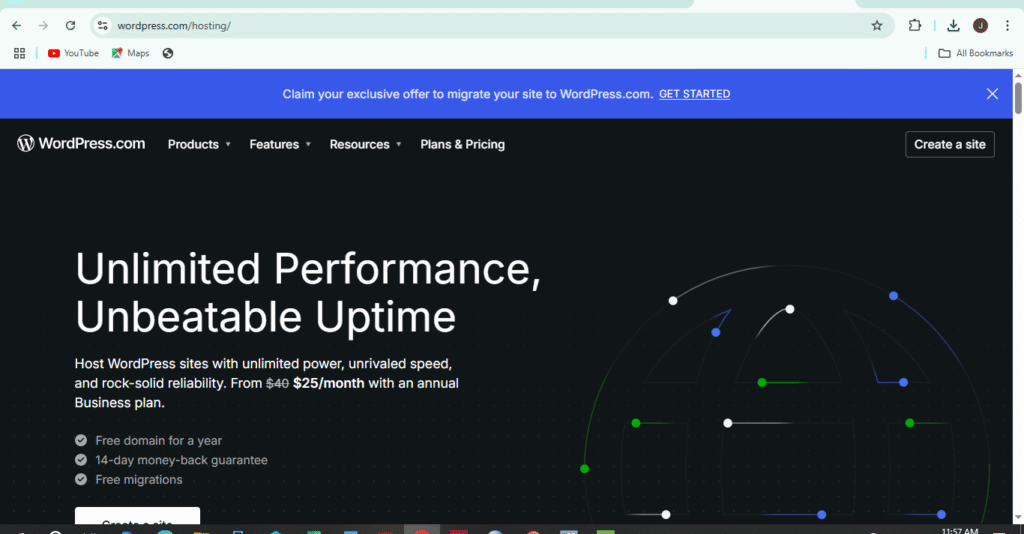Introduction
WordPress has dominated the content management system (CMS) landscape for the last decade, but for many in 2025, with new competitors and technology evolving on the web, the question has been raised: Is WordPress still the best CMS?
In this review article, we plan on taking a thorough look at this by examining its features, advantages and disadvantages, ease of use, performance, and how it compares to newer platforms as we sit in 2025. This review is meant to help beginners, bloggers, business owners, or even developers, determine if this is the best option for their next website.
What Is WordPress?
WordPress is a free, open-source CMS that powers more than 40% of websites on the Internet. this tool was created for blogging in 2003, but has evolved into a complete website builder, that can support anything from personal blogs, to ecommerce stores, and large corporate websites.
There are two versions of WordPress:
WordPress.org: self-hosted, full control, free to use.
WordPress.com: hosted by Automattic, more beginner-friendly, limited control unless on a paid plan.
We will focus on WordPress.org in this review, because it allows the most flexibility and control.

Key Features of WordPress in 2025
Here’s what makes this tool a powerful CMS even in 2025:
1. Flexibility and Customization
With WordPress you can create virtually any website from small portfolios and blogs to complex ecommerce stores or membership or forum sites. You can use:
60,000+ plugins to add functionality
10,000+ themes to change its look and feel
Drag-and-drop page builders like Gutenberg and Elementor
2. SEO-Friendly Out of the Box
In 2025, search engine optimization is important and WordPress is designed for SEO- including:
Clean, customizable permalinks
Mobile friendly themes
SEO plugins like Yoast SEO and Rank Math
And if optimized correctly, can load fast
3. User-Friendly Interface
Even novices can use this with ease. WordPress dashboard can be easy, intuitive, and allow you to create content without a single line of code.
4. Strong Community and Support
With millions of users and developers around the world, there is always help out there. Whether you are in forums, watching YouTube tutorials, or in a Facebook group, you are never truly alone.
5. Regular Updates and Security
In 2025, this tool still received core updates for security and performance. The most popular themes and plugins also receive updates, which helps keep your site secure from vulnerabilities, provided you update your core, themes, and plugins.
WordPress Pros and Cons
Like any platform, this tool isn’t perfect. Here’s a balanced look:
✅ Pros
Free and open-source
Customization, including plugins and themes
Scalability
Great for SEO and mobile responsiveness
Strong community and documentation
❌ Cons
Can be overwhelming for new users
Requires maintenance and updates
Plugins can slow down website load time if not optimized
Security is dependent on host and configuration
WordPress Performance in 2025
In 2025, website speed and performance are more important than ever. Luckily, This can be one of the most performant options available, provided the hosting and optimization are appropriate for your website.
To maximize performance:
Select lightweight themes (e.g. Astra or GeneratePress)
Install a caching plugin (e.g., WP Rocket or LiteSpeed Cache)
Optimize images (e.g., ShortPixel or Smush)
Select a fast, reliable host (e.g, Cloudways, SiteGround, Kinsta)
Is WordPress Still the Best CMS in 2025?
Let’s compare WordPress to some of its biggest rivals in 2025:
🔹 WordPress vs Wix
Wix is easy for beginners but has limited customization.
this tool is much more flexible, scalable, and has access to more SEO tools.
🔹 WordPress vs Squarespace
Squarespace is nice, but less customizable.
This tool is better for scaling the business and/or those focused on SEO.
🔹 this tool vs Webflow
Webflow is cool for designers, but harder to learn.
This toool is more accessible and there is a bigger ecosystem around it.
🔹 this tool vs Shopify (for ecommerce)
Shopify makes ecommerce easier but more expensive.
WordPress + WooCommerce is cheaper, completely customizable, but requires set-up and maintenance.
In summary: WordPress is still the most flexible and scalable CMS solution in 2025. If you’re looking for full control, power with SEO, and room to grow, it is still the clear winner.
Who Should Use WordPress in 2025?
WordPress works best for:
Bloggers and content creators
Small to medium-sized businesses
Agencies and freelancers
Ecommerce store owners utilizing WooCommerce
Developers looking to build custom solutions
It probably won’t work well for:
You want an all-in-one, no-maintenance platform (check out Squarespace)
You need super simple drag-and-drop editing without any setup (check out Wix)
Conclusion
Reading through the features, advantages and comparison, it’s apparent that tool is still the best CMS for most users in 2025.
While newer platforms have started to emerge and gain traction, none have ever really been able to match the amount of control, flexibility and scalability that this tool provides. With the right plugins, themes and hosting you can literally create anything – and keep it optimized for SEO, performance, and growth.
If you’re committed to your website and won’t mind investing a little time to set it up, run it, and to learn (not to mention the actual cost of the hosting) – then WordPress is worth it.
Frequently Asked Questions (FAQs)
Is this free in 2025?
Yes, WordPress.org remains 100% free to use. You will need to pay for hosting and perhaps some premium plugins or themes.
Is this good for SEO in 2025?
Definitely. WordPress is still one of the most SEO-friendly CMS platforms available, and still a great option, especially if you pair it with plugins like Yoast or Rank Math.
Can beginners use this?
Yes, but there is a short learning curve. Once you become familiar with the dashboard, and how themes and plugins work, it becomes quite simple to manage.
Is this tool secure?
Yes, if you follow some best practices (you use security plugins, update everything, and use good hosting).
Would you like me to help you with the meta title, description, or internal linking strategy to improve SEO for the post any further. reach other posts now




